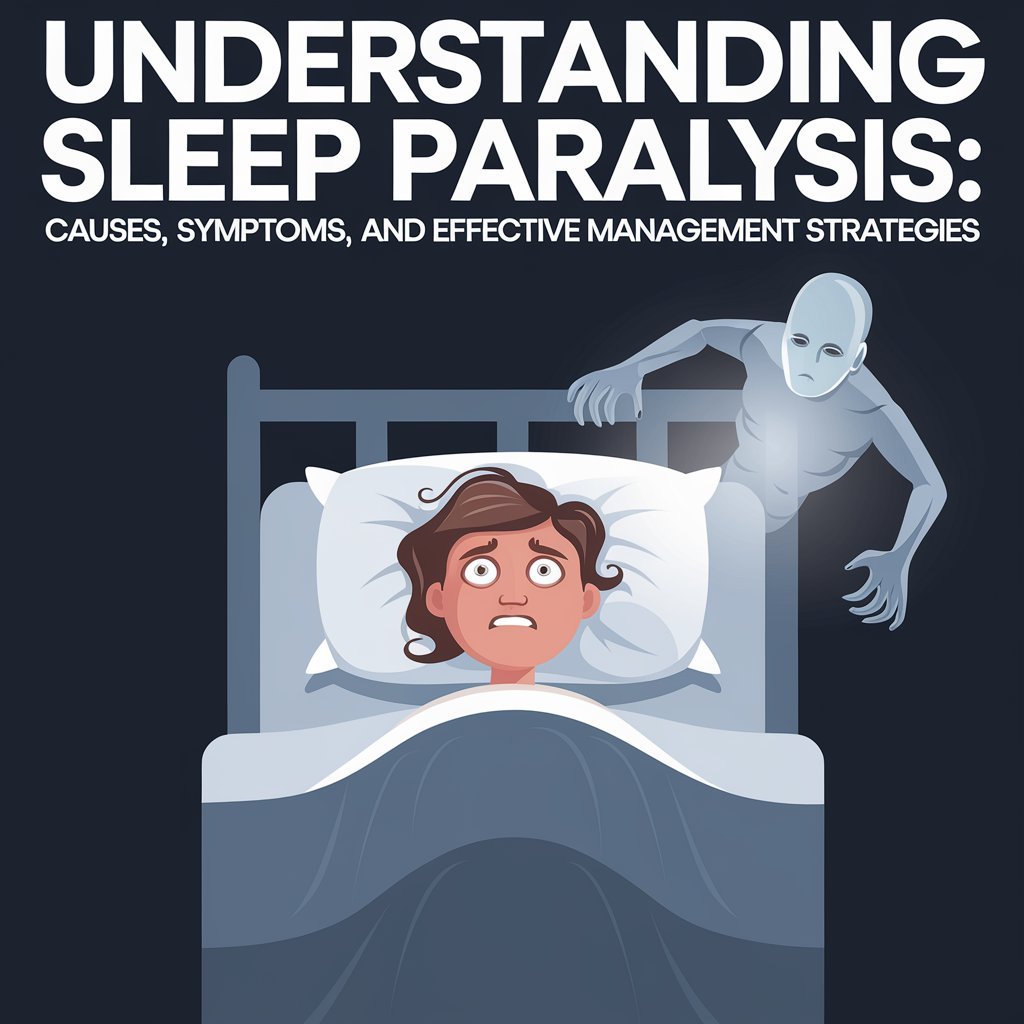This is a sleep disorder so stressful that it may temporarily paralyze a person, rendering him or her incapable of speaking as he or she transitions into sleep or wakefulness.Such an experience lasts from some seconds to minutes with strong hallucinations and chest pressure. It is such a frightening experience because it leaves the victim aware but immobile as if put in danger at some moment.
Major reasons for sleep paralysis are deprivation, irregular sleeping patterns, and some disorders that affect sleep, including insomnia and narcolepsy. In addition, the more stressed and anxious a person is, sleeps on his back, and uses substances such as alcohol and drugs; such individuals are likely to experience sleep paralysis. Mental conditions, including depression, predispose an individual to developing a sleep disorder.
General symptoms of sleep paralysis include being unable to move or speak, experiencing hallucinations, pressure in the chest, and an oppressive sense of foreboding doom. Such a phenomenon can prove to be very stressful and anxiety-provoking.
Prevent and manage sleep paralysis through proper sleep hygiene: regular schedule of sleeping, quiet sleeping environment, and no stimulants before sleep. Stress management by deep breathing and possibly meditation may lead to reduction in stress and better sleep.Other than these interventions, management of underlying sleep disorders and abstinence from drugs that tend to disrupt normal sleep could lead to managing the frequency of the episode.
If you have frequent, debilitating, or interfering sleep paralysis, you should consult with a health care provider or a sleep specialist to be able to get proper treatment options and follow-up. Understanding sleep paralysis and your triggers may help you manage these effects and improve overall sleep quality.
That phenomenon, sleep paralysis, which has fascinated and terrified humans since ancient times, often appears in folklore and popular culture as some sort of malevolent supernatural interference. But in the real world, this sleep paralysis is a disorder scientifically based. This article will discuss what really is sleep paralysis, what causes it, and how it can be managed or prevented.

What Is Sleep Paralysis?
Sleep paralysis is that condition whereby someone suffers from brief moments of paralysis when falling asleep or waking up. The duration would be a couple of minutes but could be just seconds, normally accompanied by vivid hallucinations and pressure on the chest. The experience comes as a shock, most of the time being scary and unsettling.
A person is conscious of his environment but is unable to speak or move in the case of sleep paralysis as the mind pulls loose from the body due to those movements that happen between periods of sleep and wakefulness. Paralysis is thought to be an integral part of REM sleep, when perhaps the brain is active and the rest of the body presents as paralysed in a bid to prevent acting out the dreams that occur at this point.

Causes of Sleep Paralysis
There are multiple causes of sleep paralysis, most of which relate to a quality of sleeping and general health. Some of the most common causes include the following:
1. Sleep Deprivation: Poor sleep patterns can invalidate the sleep cycle and increase the chances of getting sleep paralysis.
2. Irregular Sleep Schedule: The sleep patterns may sometimes be changed too many times, which can lead to sleep paralysis.
3. Sleep Disorders: Other diseases that are also somehow associated with sleep paralysis are narcolepsy and insomnia. Narcolepsy is medically defined as such: a chronic sleep disorder characterized by excessive daytime sleepiness and sudden sleep attacks. Episode of this nature is heavily linked with the incidence of sleep paralysis.
4. Stress and Anxiety: Anxiety and stress would also provoke a worsening sleep problem that would feature sleep paralysis. Mental and emotional stress could lead to the severity and frequency of episodes.
5. Sleep Position: It is even hypothesized that sleeping on one’s back might provoke the likelihood of experiencing such an episode of sleep paralysis more frequently. Sometimes the position may trigger episodes more than others.
6. Substance Use: The use of certain medications or substances, such as alcohol and recreational drugs, might directly impact sleep patterns and lead to sleep paralysis.
7. Mental Health Issues: There were associations between greater prevalence of sleep paralysis and depression and other mental health conditions, though the relationship could be complex and multifaceted.

Symptoms of Sleep Paralysis
The symptoms of sleep paralysis can vary but generally include the following:
Inability to Move or Speak: During an episode, the individual is conscious but cannot move his or her body or speak a word. This is painful and sets off helplessness.
Hallucinations: In most cases, the patients have reported presence of visual and auditory hallucinations during an episode of sleep paralysis. The phenomena may range from seeing shadowy figures to even hearing eerie noises.
Pressure on the Chest: A very common and widely documented feeling is a pressure sensation-or even heaviness-in the chest, sometimes even making respiration difficult for some.
Sense of Danger: There often is a pervasive sense of danger or threat during an episode, so anxiety and fear increase.

Managing and Preventing Sleep Paralysis
While sleep paralysis may be frightening, there are a few strategies that help manage and prevent episodes:
1. Improve Sleep Hygiene: Another way to avoid such possibilities as falling into sleep paralysis is to give one a normal schedule of sleeping and ensuring that one gets between 7 and 9 hours of quality sleep every night. The other advisable thing is to create an environment conducive to rest while avoiding those stimulants before bedtime.
2. Reduce Stress and Anxiety: Having stress-free activities such as exercise, meditation, and talking to a therapist would ensure overall good mental health and fewer cases of sleep paralysis.
3. Maintain a Consistent Sleep Position: Some people have reported that sleeping on their backs triggers the episodes. Try to switch to side or stomach sleeping, if that helps.
4. Avoid Substance Use: Avoiding alcohol use, as well as medications for recreational use, helps prevent sleep disorders and subsequently minimize the risks associated with sleep paralysis.
5. Address Underlying Sleep Disorders: If one suffers from conditions such as narcolepsy or insomnia, then working through it with a health care provider would also eliminate these instances of sleep paralysis.
6. Practice Relaxation Techniques: Bedtime routines that are aimed at relaxation, such as deep breathing or progressive muscle relaxation, make the transition to sleep smoother and less likely to be disrupted.

When to Seek Professional Help
Sleep paralysis is sometimes an innocent condition and will not need any medical intervention. However, if a sleep paralysis occurs frequently and becomes a cause for poor quality of life, you should visit your healthcare provider. He will diagnose the silent causes of episodes and treat them accordingly.
A sleep specialist may conduct a research study meant for re-evaluation of your sleep patterns and might actually diagnose a given sleep disorder. Treatment may be on medication or therapy as a means of correcting some issues.

Conclusion
Sleep paralysis is interestingly scaring and shakes the very foundations of sleep and consciousness. Though terrible, knowing what causes it and how symptoms appear can dispel a bit of this phenomenon and reduce fear. Taking care to establish good sleep hygiene habits, controlling levels of stress, and addressing any underlying medical conditions minimizes the effect of sleep paralysis for most people, enhancing sleep quality. If you happen to have attacks frequently or severely, it might be helpful to consult professional help for some alleviation and comfort.
After all, education and awareness would be the key steps in translating fear of sleep paralysis into an opportunity for better understanding and management of sleep health.
























I don’t think the title of your article matches the content lol. Just kidding, mainly because I had some doubts after reading the article.